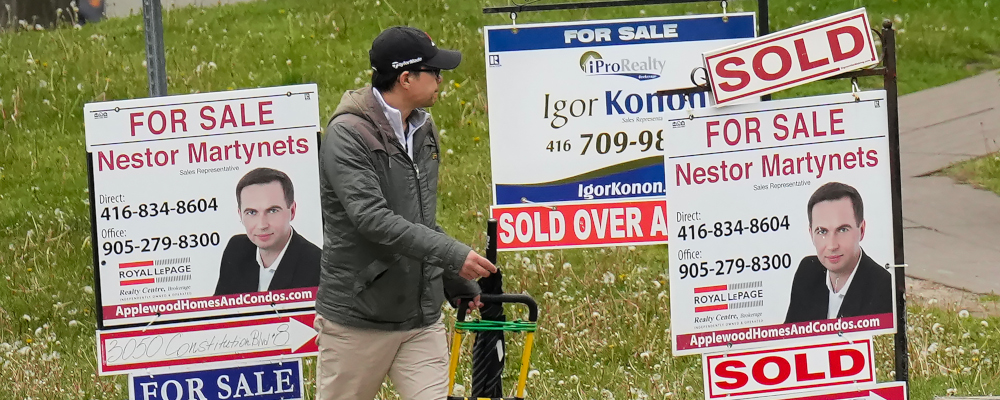All the bragging about gas tax relief in Ontario’s 2024 budget should make us laugh if it weren’t so sad. By the government’s own numbers,p. 71 that tax cut saves about $10 per month for the typical household.
There are real affordability problems in Ontario, including the budget’s forecast that average home prices will rise again. With property values increasing, there’s little hope that rents will drop. So $10 per month in gas tax relief is just a noisy distraction.
The real fiscal signal in the 2024 budget is that the Ford government has a serious revenue problem, despite investing little to reduce unaffordability pressures. Provincial plans to restore a balanced budget by means of spending restraint and revenue from future economic growth are on shaky ground. Younger voters inherit more debt, but little help with major costs of living like postsecondary and housing. Here’s why that is a bad generational deal.
Ontario tabled a $9.8 billion deficit this year when just a year ago it forecasted a $0.2 billion surplus. This $10 billion slide into deficit occurred despite budget 2024 committing little in new spending. The most noteworthy spending increase is interest payments on provincial debt—up $1.1 billion compared to 2023.

Interest payments grew twice as much as increased spending on medical care, and about twice the increase for kindergarten-to-grade-12 education. They grew three times more than spending on $10/day child care—with new child care money coming primarily from Ottawa—and four times faster than operating spending for housing. Interest payments rose significantly despite a $400 million cut to postsecondary spending. When controlling for the number of younger residents, Ontario now spends about half of what B.C. and Alberta invest in postsecondary.
Given how little new money budget 2024 invests, there is minimal hope that spending restraint alone is a viable pathway to restore balanced budgets. Nor should we be optimistic that future economic growth can deliver the necessary revenue.
Ontario enjoyed a 4.1 percent increase in GDP in 2023, higher than the 2.8 percent it predicted a year ago. Despite this robust growth, the province’s deficit ballooned compared to last year’s expectations. Since budget 2024 downgrades growth projections for the next three years, there are serious questions about revenue resiliency if Ontario plans to rely primarily on GDP increases to generate the funds needed to pay for existing provincial services.
As the path to balanced budgets looks uncertain, and the government seems unwilling to talk about new revenue from taxes, younger Canadians are picking up the tab for unpaid bills.
When this year’s $9.8 billion deficit is spread across all Ontarians under age 45 (because younger residents disproportionately bear the burden of paying for deficits), each incurs an added bill of over $1,000. By contrast, the 2024 budget adds less than $200 in new money for medical care, education, and social services for each person under 45. That’s not a good tradeoff.
Young people take on more public debt even as the province forecasts that housing affordability will worsen. Budget 2024 predicts that average home prices will rise by seven percent over the next three years,p. 6 adding another $60,000 to the $872,000 average Ontario home value in 2023.
To restore affordability for all, we need home prices to stall so there is even half a chance for earnings to catch up and for pressures on rents to subside. Sadly, budget 2024 predicts the opposite—that home prices will rise by twice the rate of inflation as of 2026.

One reason for this is that Ontario is failing to deliver a strong housing plan. A comparison with B.C. is helpful.
Both provinces will spend $2 billion this year in operating funds to reduce housing unaffordability. But B.C.’s investment will be spread across a population just one-third the size of Ontario’s.
Both provinces have similar schemes to discourage foreign buyers. But B.C. is ahead of Ontario on taxing empty homes, discouraging speculation, taxing home flipping, and regulating short-term rentals.
B.C. is also pressuring municipalities to adapt zoning to increase density, making fourplexes permissible when previously just duplexes and single-detached homes were allowed. Premier Ford resists this idea, putting him among the “housing gatekeepers” against which his federal counterpart, Mr. Poilievre, rails.
The bottom line is that Ontario’s 2024 budget piles more debt on younger residents, invests less in postsecondary than other provinces, rides federal coattails to improve child care, concedes it can’t contain home prices—and does all this while celebrating the decision to subsidize people burning fossil fuels as climate change rages on.
That’s a weak legacy to leave for younger residents and future generations.
Recommended for You

Need to Know: Mark Carney’s digital services tax disaster

Theo Argitis: Carney is dismantling Trudeau’s tax legacy. How will he pay for his plan?

Kirk LaPointe: B.C.’s ferry fiasco is a perfectly Canadian controversy

‘I want to make Canada a freer country’: Conservative MP Andrew Lawton talks being a newbie in Parliament, patriotism, and Pierre Poilievre’s strategy



